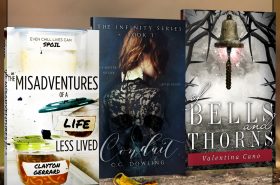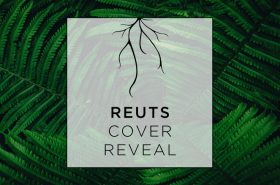
With every rejection we send, we like to leave the relationship open ended, allowing authors to reach out and ask the all-important question: why was my submission not accepted? Every author runs into this question, likely multiple times throughout the course of their publishing career. Of course we can’t divulge all the specifics, but we can give a broad explanation specific to your manuscript. We want to try and help our fellow author in any way possible, even if REUTS wasn’t the best fit for their particular story. On the heels of what’s quickly becoming the REUTS Full Transparency Series, which includes, “Hey, what’s taking so long?” The Delays of Publishing and What Not to do When Querying, I’d like to dive into a bit of the factors—or, in this case facets—of why a manuscript might be rejected.
[Side note: Also applicable is our Why Rejection Sucks, From Both Sides blog post]
Below you’ll find the five major facets that play a part in deciding whether to request a full-manuscript/offer a contract or reject a submission.
The Multiple Facets of Rejection
Writing Quality
Let’s face it: there are a lot of people out there pursuing their dreams of becoming a published author. A lot. Statistically speaking, that means we see both fantastic, amazing, I’m-so-jealous-of-this-writing writing, and then we see underdeveloped, needs-a-bit-more-experience writing. And, in the big, wide world of authors and publishing, most of the time the writing isn’t as spectacular as we’d like it to be when considering a submission. Since we’re immediately given some insight into your writing style via the query letter (and then samples, if they’re requested), your writing quality is almost like the first hurdle to overcome. It’s the first impression, just like a book cover in a bookstore. It’s something that can instantly determine our decision.
Now, speaking from a REUTS’s perspective, Editing Quality is different than Writing Quality. As we state on our website, we’re always looking for the diamonds in the rough (rough . . . rough . . . rough . . . Aladdin, anyone?) and try our best to read in between the lines, for the story beneath the words. That means if your weak points are spelling, grammar, punctuation, etc . . . we won’t immediately write-off your story (pun definitely intended). That’s exactly why we have an editing team—to edit (and trust me, they get hungry when you don’t have any editorial work to feed them). So the difference really is in the quality of the writing, the way you structure words into sentences, sentences into paragraphs, and this then leads me into my next point . . .
Story Building
Continuing from my point above, Story Building is something we try to determine from a synopsis and the sample pages we request. Sometimes the writing can be picture perfect, beautiful, the words flowing like velvet across the screen, but if the story doesn’t manage to suck us in right at the start, or continue to hold our interest, then we have a problem. Sure, with only a ten page (as requested by REUTS) manuscript sample, we’re not always able to determine if the story building matches up to the standards we’re looking for, which is why we’re more lenient on this point and will likely request a full-manuscript. But if you’re unsuccessful in, at the very least, grabbing our attention at the start of your manuscript, there is a slim chance we’ll request to read more. Just like your writing quality, the first few paragraphs of your story are meant to take an iron-gripped hold of us and never let go. It’s the ZING—BANG—POW of your story, and instead if I’m worked into a yawn, that doesn’t bode well for response.
Submission Formatting/Errors
This happens every so often, when an author (for whatever reason) doesn’t follow our submission guidelines. Either we get something addressed to another publication or agent, something outside of the genres we publish or completely negating the required fields of our form, any submission formatting/errors are cause for an almost immediate rejection. This just comes down to time (or lack thereof) of our acquisitions team members. We get so many submission that do follow our guidelines, we don’t have time to check up on the ones that don’t. Most submission guidelines are there for a reason, and to not follow them is not only disrespectful to the people you’re querying, but gives us a very bad first impression–of your attention to detail, of your interest in our company, of you. And we hate to say that because we want to be the cheering section for all authors pursing their dreams, but sometimes we have to draw a line in the sand.
Conflict of Interest
This one is simple and easy to determine from a query alone; if we currently have a title in our collection (either published or in production) too similar to something you’re pitching, we’re almost always going to send a rejection. Exception: if a submission can be coupled together with a title in a similar genre, with a similar feel (but not too similar, there is a difference) we may consider it. For example, if we have a meta-fantasy book in our collection about how story characters come to life (a la Off Book, by Jessica Dall), we’ll be more attracted to stories where book characters are aware of their existence, or a story where the line between a book world and the real world blur (a la Inkheart by Cornelia Funke or The Never Ending Story by Michael Ende).
Author Personality/Online Representation
We hate to say it but it wouldn’t be full transparency without addressing how authors maintain their online persona. At a boutique pub like REUTS, our team is 110% hands-on during the production of a book–that means dealing with the author on a daily basis. Since we have such a tight-knit team, and we consider ourselves (team members and authors) a family, that means searching for the right personalities to seamlessly fold into the bunch. Unfortunately, if via your submission or your social media accounts (e.g. Twitter) we see behavior that’s concerning, difficult to work with, or just downright offensive, it does weigh into our decision. And yes, this means we do check you out when you submit (otherwise known as online stalking). Authors should consider their submission to any publication or literary agency as if it’s a job interview, and there are quite a few things you don’t do when applying for a job:
- Bad mouth any connection to the individual or the company in plain view.
- Post questionable/offensive/any word that ends in -ist messages.
- Brag and or harass (either other authors or the people you’re submitting to)
It’s a bit of selfishness and a bit of a preemptive strike; we want to work with authors with good personalities, a positive outlook and who will make the long . . . tedious . . . and always stressful journey toward publication just a little more enjoyable. Our team tries to go beyond the publisher-author relationship, and many times we develop deep friendships with our authors. Trust me, the way you present yourself in any situation makes a huge impact on us publishing folk.
If you have any questions about this article, or have a question/topic for another article that might fit nicely with our REUTS Full Transparency Series (there, I dubbed it as such. It is so), let us know in the comments! Any member of the REUTS team is accessible, so don’t hesitate to let us know what you’re thinking.
And if you want to follow my spastic, usually incoherent ramblings, check me out on Twitter @amRuggs! I tweet a lot about gifs, memes, and booze, sometimes all in one.





